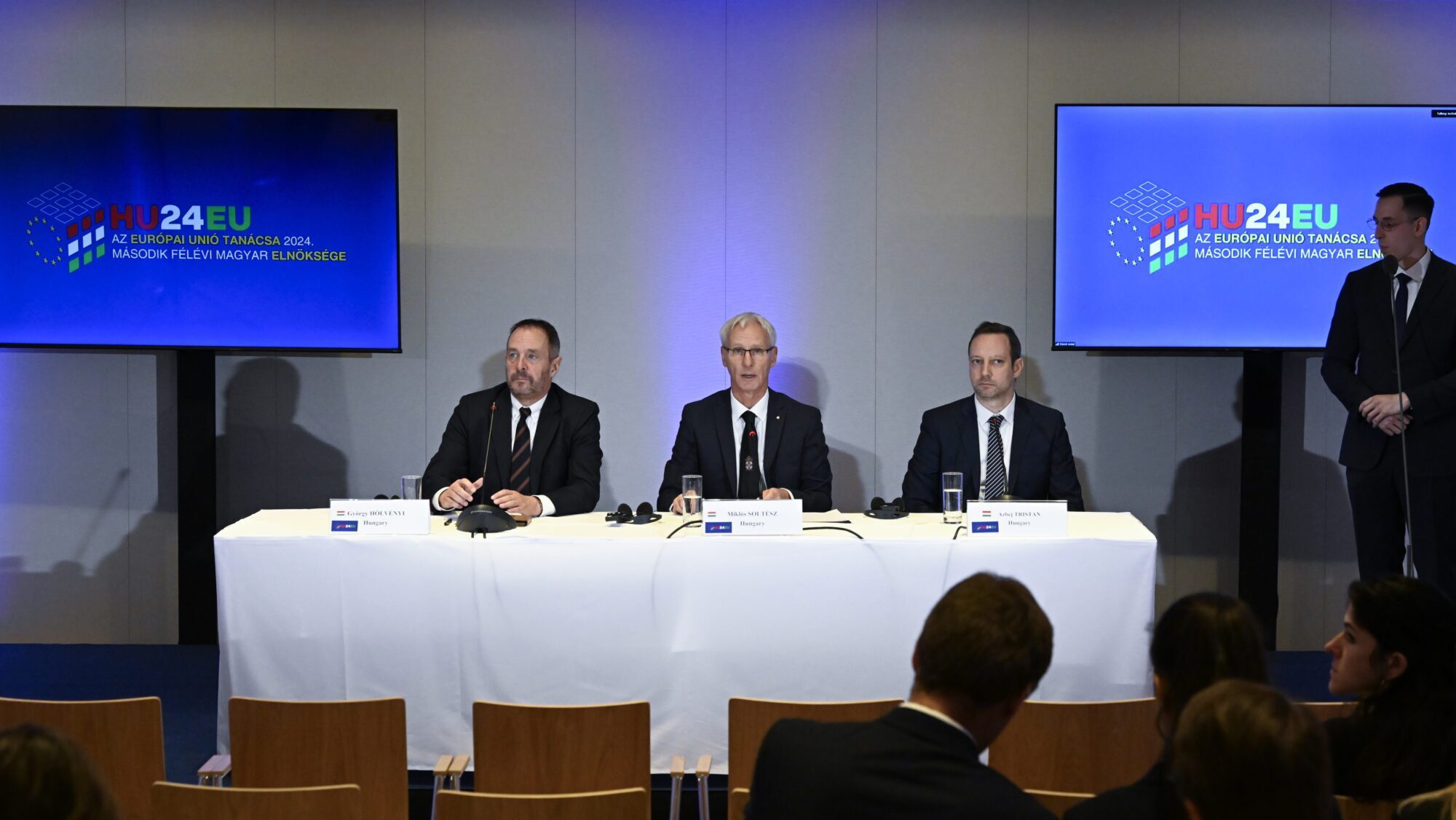
Miklós Soltész (center), the State Secretary of the Hungarian Prime Minister’s Office responsible for church and ethnic relations, speaks at the press conference of the conference “Shared responsibility: cooperation between states and religious communities,” organized as a program of the consecutive Hungarian EU presidency in the Museum of Ethnography, Budapest, on October 18, 2024. Next to him is György Hölvényi (left), MEP for the KDNP and goodwill ambassador of the Hungary Helps Program, and Azbej Tristan (right), Hungarian State Secretary for the Aid of Persecuted Christians.
Photo: MTI/Tamás Kovács
Without the guidance of religious communities, Europe’s leaders will continue to go astray, serving economic interests instead of serving communities, Miklós Soltész, the Hungarian State Secretary for Church and National Minority Relations warned at a conference in Budapest on Friday, October 18th.
The conference, entitled “Shared Responsibility: Cooperation Between States and Religious Communities in Europe,” and organised by the Hungarian EU presidency, was a gathering of politicians, religious leaders, and experts from all over the world.
Miklós Soltész said he could not help but make a comparison between the communism that Hungary and the rest of Central Europe had suffered from for almost half a decade, and the “selfish, power-hungry, distorted ideologies” that Europe is experiencing today.
“We know what it’s like when they try to enforce a dictatorship on us,” the state secretary said, adding that we do not want to live through such an era ever again.
He said that the founding fathers of the EU had emphasised the need to support religious communities, and for the state to have a strong relationship with them, but today’s leaders do not heed the advice of religious leaders and continue to walk a path that supports war and arms manufacturers who heap destruction and misery on the lives of hundreds of thousands of people.
The leaders of today also embrace ideologies, such as neo-Marxism and gender ideology, that are alien to the world God created. They also ignore the dangers of a migration that has strengthened religious fanaticism, has led to terrorist acts in Europe, and overall threatens to destroy our Jewish-Christian cultural heritage.
The state secretary derided EU leaders for punishing Hungary and withholding EU funds for pointing out these problems and for trying to address them in its own way, as a sovereign member state has the right to do. Miklós Soltész warned that Europe’s leaders have to abandon their selfish desires to serve economic interest groups, and should start serving the interests of Europe’s communities, nations, and countries with a Christian approach.
Tristan Azbej, the Hungarian State Secretary for the Aid of Persecuted Christians reminded the audience that Hungary was the first European country to dedicate an entire office to help Christians in need. Christians are the most persecuted religious community in the world, with around 360 million people being affected. However, the international community, as well as European leaders, tend to ignore this fact and sometimes even deny that it is a major problem. That is why Hungary has taken the lead and has helped two million people in sixty different countries since 2016, when the Hungary Helps programme was set up.
Azbej emphasised that the need for religious communities to live side by side in peace and harmony is of the utmost importance to dissuade people from migrating to other parts of the world. Migration has led to the persecution of Christians in Europe as well. We hear daily reports of fanatical Islamists attacking Christians, yet nobody is prepared to stand up for Christians, which is why Hungary has decided to take the initiative, he added.
György Hölvényi, a Member of the European Parliament for the conservative Hungarian Christian Democratic People’s Party, which is part of the country’s governing coalition, said there is an indifferent attitude in Europe regarding Christianity and the importance of religious communities. The European leaders’ tendency to ignore dealing with these communities has severe effects, as it only emboldens Muslims who see that Christianity is not important for Europe anymore.
Matthias Inniger, a researcher of religious policy and interfaith dialogue at the North-West University in South Africa, praised Hungary for seeing the added value that the different churches give for the common good. Despite being a secular state operating on the principle of the separation of church and state, the state of Hungary has developed close cooperation with the churches, and has not excluded smaller churches like many other European countries do. There are 32 established churches in Hungary, all of whom receive financial support to set up parishes, schools, healthcare services, and renovate church buildings.
“The more the state invests in religious communities, the more society as a whole will benefit from this,” the expert argued, emphasising that religious organisations have an impact on our society. Churches are prominent actors with huge social power and transnational power that cannot be ignored, he said.
In his letter to the participants of the conference, Andor Grósz, the President of the Federation of Hungarian Jewish Communities (MAZSIHISZ), the largest Jewish group in Hungary, thanked the government for providing protection to the 100,000 Jews who live in the country today, at a time when the terror against Israel couples with rising antisemitism in Europe and on the campuses of American universities. Grósz wrote that while some Jewish people in parts of Western Europe are afraid to wear their religious clothing out of fear of being identified and targeted, Jewish life in Hungary is experiencing a renaissance, and Jews live in peace and security.
